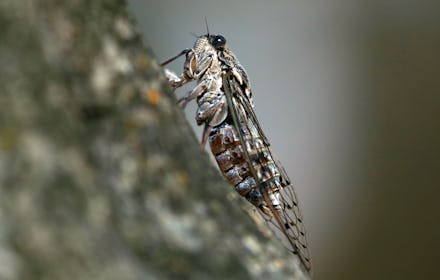We've reached the "zombie cicada" stage of 2020

God forbid a week go by in 2020 without something inexplicably weird or upsetting happening. The latest sign that we are living in the worst timeline is a horror movie come to life in West Virginia. According to research conducted by the University of West Virginia, it appears that a parasitic fungus has taken control of cicadas in the region and is using them to attack and infect other insects.
The fungus, known as Massospora, was identified earlier this year in a research paper published in June in the journal PLOS Pathogens. According to researchers, it is a psychedelic fungus that possesses chemicals similar to those found in hallucinogenic mushrooms. When cicadas come into contact with these fungi, though, they are guaranteed to have a bad trip.
The spores of the Massospora essentially eat away at the cicada from the inside. It destroys the insect's genitals, rear end, and abdomen — replacing as much as one-third of the creature's body with fungal tissue. At this point, the cicada is kept alive as a host to the fungus and is largely under its control, completely oblivious to the fact that it is being manipulated. Once it has hijacked the bodies of these hosts, the fungus goes to work spreading itself to other insects through a bit of seduction and manipulation.
In order to infect other cicada, the Massospora uses the already infected to entice others. The fungus replicates the mating calls of cicadas to trick others into engaging with them. Infected cicada can't mate, but they can transmit the fungus to the otherwise healthy insects that fall for the trap. The fungus has even been known to use male cicada to imitate the female mating invitation, flicking their wings to attract interested males. They often fall for this, giving in to the worst impulses of being a horny male bug, and the spores are sexually transmitted to them. The fungus then starts the process again with the new victims.
While the fungus might be up there in terms of the worst imaginable STD, it doesn't have to spread this way, so cicada condoms would do no good. It can also spread simply by using the zombie cicada to fly around or walk on branches. The spores spread through these actions, acting as what the researchers call "flying saltshakers of death," because the spores fall out of the backends of the bugs like salt from a saltshaker.
While the fate of being infected by a fungus that eats away at your genitalia and body seems like a mighty cruel fate, the researchers note that the zombification process is more interesting than it is problematic. Cicada reproduce so quickly that even if the fungus hijacks a portion of a brood, researchers believe that it is unlikely to have any noticeable effect on the overall population. The infection also poses no real risk to humans. The researchers noted that the infected cicada tend to be docile and humans can pick them up and see the fungus, but they don't have to worry about insects attacking or spreading their spores beyond the bugs.
That's probably not all that reassuring to the cicada, who will suffer the cruel fate of being zombified, but they won't even know what is happening to them when the fungus takes over. It'll be like one long psychedelic trip, except at the end they'll die.